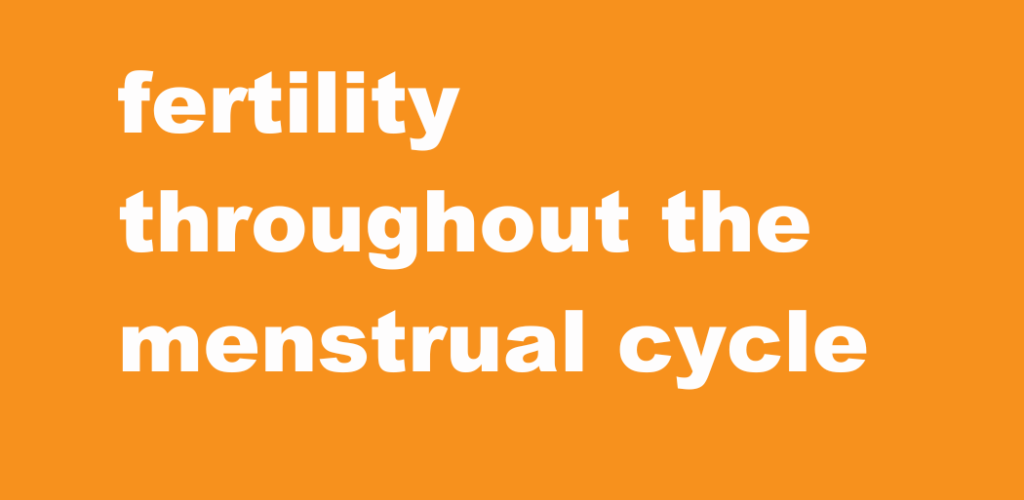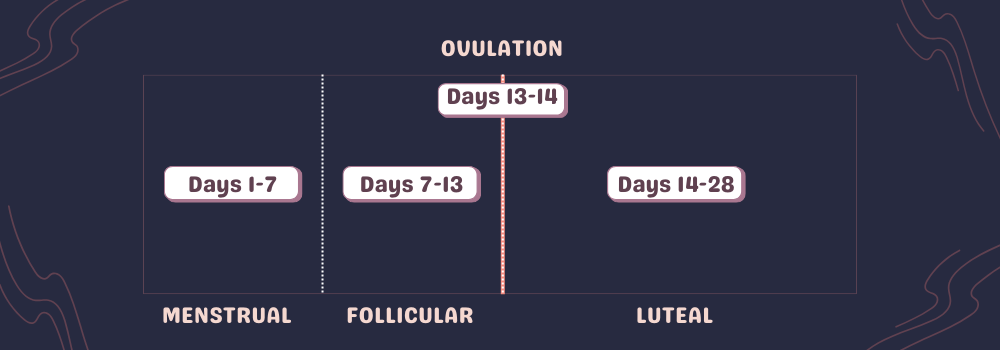

A really common question we get on Teen Health Source is how likely pregnancy might be depending on where someone is at in their cycle. A whole bunch of factors come into play when we answer this question, we think about what sort of sex was had, if any barriers were used, things like birth control and emergency contraception, and of course we think about menstrual cycles!
Fertility, or the ability to get pregnant is a pretty complex thing with a lot of factors that can impact it including genetics, contraception use, and where you’re at in your menstrual cycle. For most people, fertility changes quite a bit throughout their menstrual cycle depending on hormones, the release of eggs, and where the egg is in your body throughout your cycle. This article will talk about how your cycle can impact the likelihood of you getting pregnant!
Fertility is largely dependent on a person’s body and hormones. For people with uteruses, hormones dictate the stages of the menstrual cycle, telling the body when to produce, release, and dispose of eggs, among other things. A person with a uterus will typically produce one egg per menstrual cycle. If this egg becomes fertilized by sperm, then it may implant in the uterus where it can mature into a fetus, resulting in pregnancy. However, this process is not guaranteed for every person even if insemination happens.
In general, people with uteruses are most fertile just before and during a time called ovulation. At this time, a mature egg has finished developing and is traveling from the ovary towards the uterus. For more information on some of the more anatomy-focused terms, you can check out our article on vaginas and uteruses here.
The menstrual cycle lasts 28 days on average. For some people this may be as short as 23 days, or as long as 35 days (or longer)! There are four phases in the cycle: the menstrual phase, the follicular phase, ovulation, and the luteal phase. Each phase also has a typical length that can vary from person to person. For more information about periods, you can visit Teen Health Source’s article about Period Basics.

Pregnancy requires an egg to be fertilized by a living sperm cell, and how accessible that egg is will change throughout your cycle. Ovulation is when this is most likely to occur, so the closer to ovulating you are, the more likely it is for pregnancy to happen. If sperm reaches the egg during ovulation and successfully fertilizes it, the body will usually start developing the fertilized egg into a fetus, resulting in conception. Even though ovulation is only around 24 hours, sperm can live in the body for up to 5 days, so tracking your cycle can give you a better idea of what your pregnancy risk might look like, and help you plan around that.
Tracking fertility based on your menstrual cycle is a useful way to plan for or prevent pregnancy. For more information about using this as a contraception option, you can read Teen Health Source’s article about Fertility Awareness Methods.
It’s important to note that Fertility Awareness Methods are most effective when used with other forms of contraception. Menstrual cycles can be unpredictable and sperm can live in the body for up to 5 days depending on the conditions.
*We know that these aren’t the words everyone uses for their bodies (eg. trans folks) and support you using the language that feels best for you.
If you have questions about this topic, feel free to contact one of our peer educators. [Link]
Last Updated: March 2024

Learn more about Black Futures with Teen Health Source and TEACH! Listen to Paula’s interview about the future of Blackness and some highlights of work focusing on imagining new Black realities!

Check out this list of health clinics in the GTA who sell and do IUD insertions across the city.

Not all teens want their parents finding out about their sex life. Regardless of the reason, we believe that you should be in control of who finds out about your personal health information. But what does the law say?